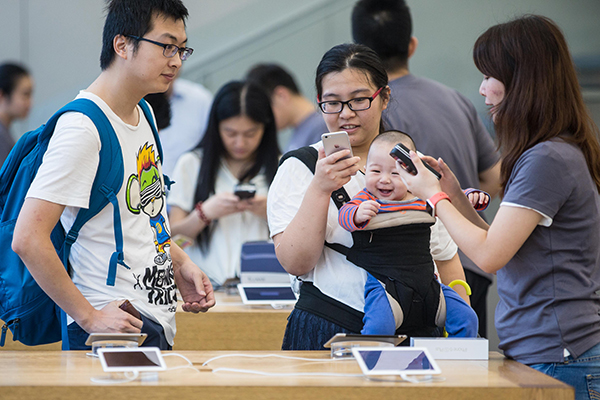 |
|
An outlet of Apple Inc in Hangzhou, capital of Zhejiang province. [Photo/China Daily] |
Homegrown smartphone vendors made further progress in the domestic mid- to high-end sector last year, gaining ground on long-term leaders such as Samsung Electronics Co Ltd, an industry report has revealed.
Chinese buyers increased their demand for handsets priced more than 2,000 yuan ($300), according to the study from Nielsen Holdings Plc, with figures showing the category enjoyed an 8.8 percent increase in sales during 2015.
Huawei Technologies Co Ltd, based in Shenzhen, Guangdong province, saw the most significant market share jump in the price range, with its high-end devices controlling 2.13 percent of the domestic market by December compared with just 0.34 percent at the start of the year.
James Gong, vice-president of Nielsen China, said as Chinese consumers become increasingly choosy when buying a new mobile phone, vendors are having to release more premium products.
"Failing to do so will create challenges in both margin and market share," said Gong.
The report also highlighted a long list of local vendors now growing their market shares, including Xiaomi Corp, vivo Communication Technology Co Ltd and OPPO Electronics Corp.
The Nielsen report mainly covers Android-based devices and Apple Inc's iPhone series, which runs iOS, was not included.
Earlier figures from United States market research firm International Data Corporation have shown that overall the Chinese smartphone market stagnated in the past year, with 434 million devices being shipped compared with 423.3 million the year before.
Kitty Fok, the head of IDC China, said Huawei, Xiaomi and other local players as a result are being forced to target higher-end sales to lift profit margins.
On average, Chinese users spend 170 minutes on their smartphone daily, which now outstrips their use of other devices such as TVs or personal computers.
"This highly engaging behavior has also resulted in people choosing smartphones with better performance," said Gong.
Experts are predicting that competition in the country's high-end handset market is set to heat up even more, as Chinese makers target premium customers with flagship devices priced above 3,000 yuan.
Huawei's flagship device is priced as high as 4,399 yuan. The company is also aiming at growing its overseas sales of top-end devices, as still 70 percent of its smartphone sales are made on home turf.
Vivo is following the same route. It released a smartphone priced at 4,288 yuan on Tuesday, equipped with a curved screen and 128 gigabytes in storage, which the company hopes will challenge the ongoing dominance of Samsung's Galaxy Edge, and Apple's iPhone in the high-end market.
